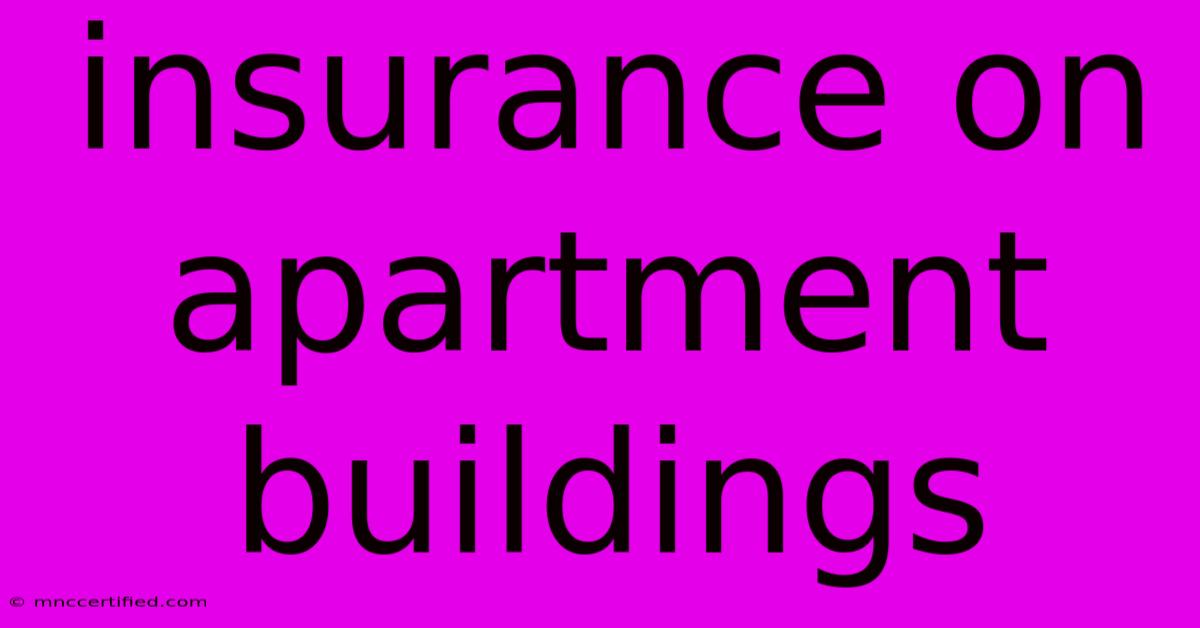Insurance On Apartment Buildings

Table of Contents
Insurance on Apartment Buildings: A Comprehensive Guide for Landlords
Owning and managing an apartment building is a significant undertaking, demanding careful planning and attention to detail. One crucial aspect often overlooked is adequate insurance coverage. This comprehensive guide will delve into the essential insurance policies you need to protect your investment and your tenants.
Understanding the Risks of Apartment Building Ownership
Before diving into specific policies, let's examine the unique risks associated with apartment buildings:
- Property Damage: Fires, storms, vandalism, and other unforeseen events can cause substantial damage to the building's structure and common areas.
- Liability: Accidents on the property, tenant disputes, or injuries sustained by visitors can lead to costly lawsuits.
- Loss of Rent: If a covered event renders units uninhabitable, you'll lose rental income. This can severely impact your financial stability.
- Contents Damage: While not directly your responsibility, you might be liable for damage to tenants' belongings under certain circumstances.
- Business Interruption: Extensive damage can force you to close the building temporarily, resulting in lost income and added expenses.
Essential Insurance Policies for Apartment Buildings
To mitigate these risks, consider these key insurance policies:
1. Building Insurance (Property Insurance):
This is the cornerstone of your apartment building insurance. It covers damage to the building's structure, including the foundation, walls, roof, and other permanent fixtures. Be sure to accurately assess the building's replacement cost, not just its market value. Underinsurance can leave you significantly short in the event of a major loss. Consider adding coverage for:
- Ordinance or Law Coverage: This covers costs associated with upgrading the building to meet current building codes after a covered loss.
- Increased Cost of Construction: This addresses the rising costs of materials and labor in rebuilding.
2. Liability Insurance:
This protects you from financial losses arising from third-party claims of bodily injury or property damage on your property. It covers legal fees, settlements, and judgments. High liability limits are crucial, particularly for larger apartment complexes. Consider adding an umbrella liability policy for extra protection beyond your primary liability coverage.
3. Loss of Rent Insurance:
This policy compensates you for lost rental income if a covered event makes units uninhabitable. This ensures you continue to receive income even while repairs or rebuilding are underway. This is particularly vital during extended periods of unavailability.
4. Workers' Compensation Insurance (if applicable):
If you employ staff to manage or maintain the building, workers' compensation insurance is mandatory in most jurisdictions. This protects your employees in case of work-related injuries or illnesses.
5. Commercial General Liability Insurance (CGL):
This broader policy provides coverage for a wider range of business-related liabilities, including advertising injuries, product liability (if you provide amenities), and other potential claims. While overlapping with liability insurance in some aspects, it provides a more comprehensive layer of protection for the business operations associated with your apartment building.
Factors Affecting Insurance Premiums
Several factors influence the cost of your apartment building insurance premiums:
- Building age and condition: Older buildings or those in need of repair are generally more expensive to insure.
- Location: Buildings in high-risk areas (e.g., prone to flooding or earthquakes) will have higher premiums.
- Building type and construction: The materials used and the building's design influence the risk assessment.
- Security measures: Features like security systems and fire sprinklers can lower premiums.
- Claim history: Previous claims can result in increased premiums.
Choosing the Right Insurance Provider
Shopping around and comparing quotes from multiple insurers is essential. Don't solely focus on price; consider the insurer's reputation, financial stability, and customer service. Seek recommendations from other landlords and read online reviews before making a decision.
Remember: Adequate insurance is not an expense; it's an investment in protecting your valuable asset and ensuring your long-term financial security. Don't hesitate to consult with an insurance professional to determine the most appropriate coverage for your specific needs. Regularly review your policies to ensure they continue to meet your evolving requirements.

Thank you for visiting our website wich cover about Insurance On Apartment Buildings. We hope the information provided has been useful to you. Feel free to contact us if you have any questions or need further assistance. See you next time and dont miss to bookmark.
Featured Posts
-
How To Bond Aluminum To Aluminum
Nov 21, 2024
-
Fred Loya Insurance Cancellation
Nov 21, 2024
-
Insurance Fraud Texas Penal Code
Nov 21, 2024
-
Turbo Coin Price Prediction 2025
Nov 21, 2024
-
Nvidia Q3 Revenue Beats Stock Reaction
Nov 21, 2024